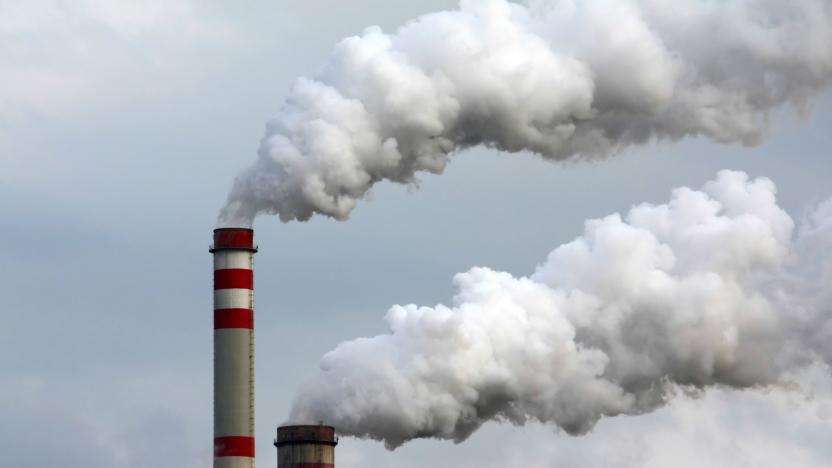carbonemissions
Latest

Microsoft announces plan to make the Xbox carbon neutral
Microsoft has joined other major tech companies such as Amazon, Google and Sony in laying out some new commitments to mitigate climate change. One of the more eye-catching measures it detailed was a pilot project to make 825,000 Xbox consoles carbon neutral. It says those'll be the first carbon-neutral consoles.

Federal report says humans are the cause of climate change
Today, over a dozen federal agencies released the Climate Science Special Report, which is a product of the National Climate Assessment -- a congressionally mandated review that takes place every four years. In it, hundreds of scientists from dozens of government agencies and academic institutions present evidence that supports the existence of a human-caused warming planet and all of the consequences that come with it. "This assessment concludes, based on extensive evidence, that it is extremely likely that human activities, especially emissions of greenhouse gases, are the dominant cause of the observed warming since the mid-20th century," the report stated. "For the warming over the last century, there is no convincing alternative explanation supported by the extent of the observational evidence."

EPA plans to repeal Obama-era Clean Power Plan
The Environmental Protection Agency (EPA) Administrator, Scott Pruitt, announced today he would sign a proposed rule that would withdraw the Obama administration's Clean Power Plan (CPP). "Here's the president's message: The war on coal is over," Pruitt said today during a speech given in Hazard, Kentucky.

Belgian scientists turn polluted air into hydrogen fuel
To save the environment, humanity needs to do two things: reduce harmful gases and produce more energy from "green" energy sources. While plenty of research projects have tried to tackle these independently, few do both at the same time. Scientists from the University of Antwerp and KU Leuven (University of Leuven) in Belgium are developing a device that cleans up the air and generates power at the same time. It relies on a process called 'heterogeneous photocatalysis,' which uses light and a special catalyst (typically a semiconductor) to trigger a chemical reaction.

Worldwide carbon emissions were flat for third year in a row
For the third year in a row, carbon emissions around the world have remained flat, according to the research group Global Carbon Project. The group revealed its findings in the Global Carbon Budget 2016, which measures how much carbon is emitted by countries around the world, and then how much of that is absorbed into the earth by plants, land and oceans. The remaining carbon hangs out in the atmosphere and drives global warming, and it's the focus of Global Carbon Project's research.

ICYMI: Getting ethanol from more than just corn
try{document.getElementById("aol-cms-player-1").style.display="none";}catch(e){}Today on In Case You Missed It: Researchers at the Oak Ridge National Laboratory created ethanol out of carbon dioxide in a way that they believe would be easy to scale up. Most importantly, the conversion happens at room temperature so it could be done nearly anywhere in the world. We are also tickled by this stop-motion music video for a new song by Dan Sultan, and enjoy the dress designer who wants to put alcohol in clothes. As always, please share any interesting tech or science videos you find by using the #ICYMI hashtag on Twitter for @mskerryd.

Earth's CO2 levels have permanently crossed the 400ppm threshold
Despite the fact that September is typically the lowest month for atmospheric carbon dioxide, the CO2 levels in Earth's atmosphere crossed the symbolic 400 parts per million threshold this month. According to climate scientists, it is extremely unlikely that the planet will ever drop below those levels again in our lifetimes.

Virgin Atlantic turned industrial waste into greener jet fuel
Illinois-based LanzaTech and Virgin Atlantic have been working on an alternative fuel source for Sir Richard Branson's flagship airline since 2011. This week, the two companies announced a breakthrough that could drastically reduce the airline industry's carbon emissions. LanzaTech has produced 1,500 US gallons of jet fuel derived from the industrial gases given off by steel mills.

Scientists want to make buildings from bone
A cityscape made of bone and eggshell might sound like the set for the final act of some big-budget fantasy epic, but the idea could help support ever-growing populations in our cities -- and reduce carbon emissions in the process. According the University of Cambridge, typical materials like concrete and steel make up almost 10 percent of global carbon emissions. Before they even get to the place of construction, both materials need high temperatures to be processed, and thus a whole load of energy. Researchers are hoping that artificial bone and eggshell, made of protein and minerals, could one day stand in for traditional building materials.

Coral reefs will continue dying unless carbon output drops
Growing an endangered species of coral in a lab is one thing, but rebuilding a reef damaged by ocean acidification is a complete other. On paper, though, it's possible. A group of researchers attempted to counter the effects of rising carbon dioxide levels around Australia's Great Barrier Reef by pumping sodium hydroxide into lagoons that were isolated from the ocean during low tide, according to The Verge.

Google details its carbon footprint in new report, makes you think twice about Rickrolling someone
The folks in Mountain View have always been obsessed with performance, but until now, Google had never come clean with the nitty-gritty surrounding power usage. A new report published by the company tells all, revealing that the search giant emits 1.5 million tons of carbon annually; a figure roughly on par with the UN's operational footprint, or slightly more than the amount produced by the entire country of Laos. The docket also breaks down the carbon emissions by activity, too: individual searches yield 0.2g, ten minutes of YouTube emits 1g and the average Gmail user produces 1.2kg of CO2 over a year -- which on average equates to a grand total of 1.46kg of CO2 per plebe across its properties. According to Google, that's a figure that would have been higher had it not custom designed its data centers, achieving a fifty percent reduction in energy usage versus the industry average. Plenty of infographical delight awaits you at the source below.

IBM and Portland team up to see into city's future
Is it possible to see into a city's future? Perhaps, if you're backed by a company like IBM. The computing giant has teamed up with Portland, Oregon for its Systems Dynamics for Smarter Cities program, creating a simulation of the city (a veritable "Sim City," as it were), so governmental leaders can see the ways in which public policies might affect its future. IBM approached the northwestern cultural mecca back in 2009, working with representatives from a number of professions, including teachers, economists, city planners, and business leaders in the interim. The information collected was combined with governmental data to create a computer-based model of the city. Among other things, city leaders have used the model to work out a plan to reduce the city's carbon emissions 80 percent by the year 2050. Add in a guide to those famous Portland food carts and we'll be 100 percent behind the project.

Gordon Murray reveals new Batmobile, Dark Knight gets serious about reducing carbon footprint
So you've finished building your Batman Forever-style Batmobile, your Tumbler's up on blocks in the front yard, and you're itching for a new project. It's not too early to start planning a DIY version of Gordon Murray's newly unveiled Bat-ride (part of the Batman Live World Arena Tour). The designer drew on his experience with the McLaren F1 for his new concept car, which includes a healthy dose of imagineering: there's a carbon-fiber body that "breathes," as well as LED-lit "virtual wheels." We're not sure how carbon fiber breathes or what virtual wheels are, but as Murray explains in the video below, they're based on Formula One materials as he imagines them 15-20 years from now. He also envisions a greener Dark Knight, whose ride runs on hydrogen fuel cells and lithium-ion batteries -- no longer will the caped crusader suffer a guilty conscience due to his excessive carbon dioxide emissions.

NEC turns your home into a carbon-tracking game controller
Are you bored with keeping tabs of your carbon emissions? NEC and BIGLOBE have developed a system that not only performs this odious task, but makes it "fun" to do so -- if you're generous as to what constitutes "fun." A WiFi-enabled device is attached to your circuit breaker, where it keeps track of your power consumption and later transmits it to your home computer via ZigBee. The data is then sent to a website, where you can use it to play games against other green households in such thrilling arenas as Carbon Diet (users score "eco-points" with which they can purchase virtual soil, water, flowers and grass) and Carbon Ball, in which Dung Beetles compete to see who can travel the farthest, with distance being determined by -- you guessed it -- how well the user reduces power consumption. But that ain't all -- the system also keeps tabs on daily and hourly energy consumption, your rank in comparison with other households, and more. A three-month trial service is underway in the homes of 100 NEC employees, after which the companies will analyze the data and develop a business model for unloading this bad boy on local governments and the private sector. One more pic after the break.[Via Pink Tentacle]









